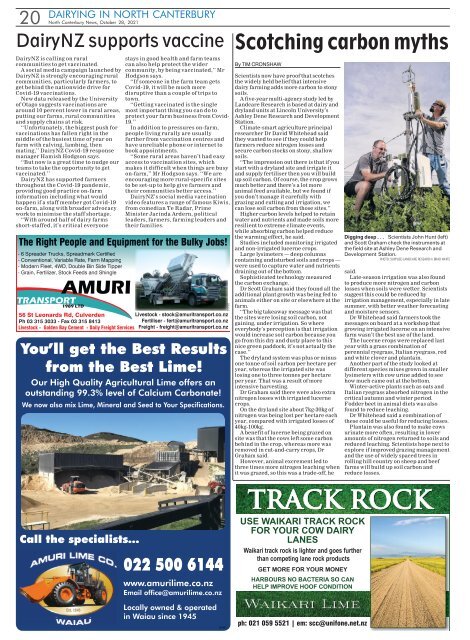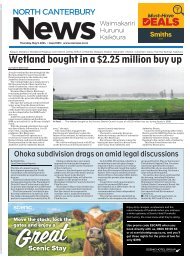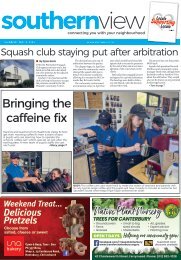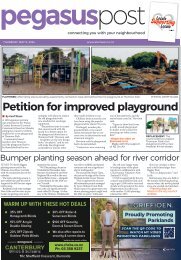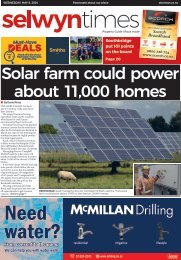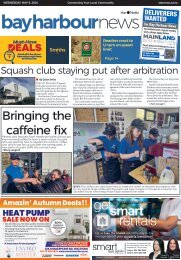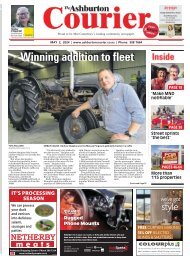North Canterbury News: October 28, 2021
Create successful ePaper yourself
Turn your PDF publications into a flip-book with our unique Google optimized e-Paper software.
DAIRYING IN NORTH CANTERBURY<br />
20 <strong>North</strong> <strong>Canterbury</strong> <strong>News</strong>, <strong>October</strong> <strong>28</strong>, <strong>2021</strong><br />
DairyNZ supports vaccine<br />
DairyNZiscalling on rural<br />
communities to getvaccinated.<br />
Asocial media campaign launched by<br />
DairyNZisstrongly encouraging rural<br />
communities, particularly farmers, to<br />
get behind thenationwidedrive for<br />
Covid19 vaccinations.<br />
New data releasedbythe University<br />
of Otago suggests vaccinations are<br />
around 10 percentlowerinrural areas,<br />
puttingour farms, rural communities<br />
and supply chains at risk.<br />
‘‘Unfortunately, the biggest push for<br />
vaccinationshas fallenright in the<br />
middleofthe busiest time of yearon<br />
farmwith calving, lambing, then<br />
mating,’’ DairyNZ Covid19 response<br />
manager Hamish Hodgson says.<br />
‘‘But nowisagreat time to nudge our<br />
teams to take the opportunity to get<br />
vaccinated.’’<br />
DairyNZ hassupportedfarmers<br />
throughout theCovid19 pandemic,<br />
providing good practice onfarm<br />
information including what would<br />
happen if astaffmember got Covid19<br />
onfarm, along with broader advocacy<br />
worktominimise the staff shortage.<br />
‘‘With around halfofdairyfarms<br />
shortstaffed,it’s critical everyone<br />
The Right People andEquipment forthe Bulky<br />
Jobs!<br />
-6Spreader Trucks, Spreadmark Certified<br />
-Conventional, Variable Rate, Farm Mapping<br />
-Modern Fleet, 4WD, Double Bin Side Tipper<br />
-Grain, Fertilizer, Stock Feeds and Shingle<br />
staysingood health andfarm teams<br />
canalso help protect the wider<br />
community, by being vaccinated,’’ Mr<br />
Hodgson says.<br />
‘‘If someone in the farm team gets<br />
Covid19,itwillbemuch more<br />
disruptive than acoupleoftrips to<br />
town.<br />
‘‘Getting vaccinated is thesingle<br />
most important thingyou can do to<br />
protect your farmbusiness from Covid<br />
19.’’<br />
In addition to pressures onfarm,<br />
people living rurallyare usually<br />
further from vaccination centres and<br />
have unreliable phoneorinternet to<br />
book appointments.<br />
‘‘Some rural areas haven’t had easy<br />
access to vaccination sites, which<br />
makes it difficult when things are busy<br />
onfarm,’’MrHodgson says. ‘‘We are<br />
encouraging moreruralspecific sites<br />
to be setup to help give farmers and<br />
theircommunities better access.’’<br />
DairyNZ’s social media vaccination<br />
videofeaturesarange of famous Kiwis,<br />
from comedianTeRadar, Prime<br />
Minister Jacinda Ardern, political<br />
leaders, farmers, farming leaders and<br />
theirfamilies.<br />
56 St Leonards Rd, Culverden<br />
Livestock -stock@amuritransport.co.nz<br />
Ph 03 315 3033 -Fax 03 315 8413<br />
Fertiliser -fert@amuritransport.co.nz<br />
Livestock - Golden Bay Cement -Daily Freight Services Freight -freight@amuritransport.co.nz<br />
You’ll get the Best Results<br />
from the Best Lime!<br />
Our High Quality Agricultural Lime offers an<br />
outstanding 99.3% level of Calcium Carbonate!<br />
We now also mix Lime, Mineral and Seed to Your Specifications.<br />
2197562<br />
Scotching carbon myths<br />
By TIM CRONSHAW<br />
Scientists now have proof that scotches<br />
the widely held belief that intensive<br />
dairy farming adds more carbon to stony<br />
soils.<br />
Afiveyear multiagency study led by<br />
Landcare Research is based at dairy and<br />
dryland units at Lincoln University’s<br />
Ashley Dene Research and Development<br />
Station.<br />
Climatesmart agriculture principal<br />
researcher Dr David Whitehead said<br />
they wanted to see if they could help<br />
farmers reduce nitrogen losses and<br />
secure carbon stocks on stony, shallow<br />
soils.<br />
‘‘The impression out there is that if you<br />
start with adryland site and irrigate it<br />
and supply fertiliser then you will build<br />
up soil carbon. Of course, the crop grows<br />
much better and there’s alot more<br />
animal feed available, but we found if<br />
you don’t manage it carefully with<br />
grazing and cutting and irrigation, we<br />
can lose soil carbon from those sites.’’<br />
Higher carbon levels helped to retain<br />
water and nutrients and made soils more<br />
resilient to extreme climate events,<br />
while absorbing carbon helped reduce<br />
the warming effect, he said.<br />
Studies included monitoring irrigated<br />
and nonirrigated lucerne crops.<br />
Large lysimeters —deep columns<br />
containing undisturbed soils and crops —<br />
were used to capture water and nutrients<br />
draining out of the bottom.<br />
Sophisticated technology measured<br />
the carbon exchange.<br />
Dr Scott Graham said they found all the<br />
additional plant growth was being fed to<br />
animals either on site or elsewhere at the<br />
farm.<br />
‘‘The big takeaway message was that<br />
the sites were losing soil carbon, not<br />
gaining, under irrigation. So where<br />
everybody’s perception is that irrigation<br />
would increase soil carbon because you<br />
go from this dry and dusty place to this<br />
nice green paddock, it’s not actually the<br />
case.’’<br />
The dryland system was plus or minus<br />
one tonne of soil carbon per hectare per<br />
year, whereas the irrigated site was<br />
losing one to three tonnes per hectare<br />
per year. That was aresult of more<br />
intensive harvesting.<br />
Dr Graham said there were also extra<br />
nitrogen losses with irrigated lucerne<br />
crops.<br />
On the dryland site about 7kg30kg of<br />
nitrogen was being lost per hectare each<br />
year, compared with irrigated losses of<br />
40kg100kg.<br />
Abenefit of lucerne being grazed on<br />
site was that the cows left some carbon<br />
behind in the crop, whereas more was<br />
removed in cutandcarry crops, Dr<br />
Graham said.<br />
However, animal excrement led to<br />
three times more nitrogen leaching when<br />
it was grazed, so this was atradeoff, he<br />
Digging deep ... Scientists John Hunt (left)<br />
and Scott Graham check the instruments at<br />
the field site at Ashley Dene Research and<br />
Development Station.<br />
PHOTO: SUPPLIEDLANDCARE RESEARCH /BRAD WHITE<br />
said.<br />
Lateseason irrigation was also found<br />
to produce more nitrogen and carbon<br />
losses when soils were wetter. Scientists<br />
suggest this could be reduced by<br />
irrigation management, especially in late<br />
summer, with better weather forecasting<br />
and moisture sensors.<br />
Dr Whitehead said farmers took the<br />
messages on board at aworkshop that<br />
growing irrigated lucerne on an intensive<br />
farm wasn’t the best use of the land.<br />
The lucerne crops were replaced last<br />
year with agrass combination of<br />
perennial ryegrass, Italian ryegrass, red<br />
and white clover and plantain.<br />
Another part of the study looked at<br />
different species mixes grown in smaller<br />
lysimeters with cow urine added to see<br />
how much came out at the bottom.<br />
Winteractive plants such as oats and<br />
Italian ryegrass absorbed nitrogen in the<br />
critical autumn and winter period.<br />
Fodder beet in animal diets was also<br />
found to reduce leaching.<br />
Dr Whitehead said acombination of<br />
these could be useful for reducing losses.<br />
Plantain was also found to make cows<br />
urinate more often, resulting in lower<br />
amounts of nitrogen returned to soils and<br />
reduced leaching. Scientists hope next to<br />
explore if improved grazing management<br />
and the use of widely spaced trees in<br />
rolling hill country on sheep and beef<br />
farms will build up soil carbon and<br />
reduce losses.<br />
Call the specialists...<br />
022 500 6144<br />
www.amurilime.co.nz<br />
Email office@amurilime.co.nz<br />
Locally owned &operated<br />
in Waiau since 1945<br />
2311837<br />
TRACK ROCK<br />
USE WAIKARI TRACK ROCK<br />
FOR YOUR COW DAIRY<br />
LANES<br />
Waikari track rock is lighter and goes further<br />
than competing lane rock products<br />
GET MORE FOR YOUR MONEY<br />
HARBOURS NO BACTERIA SO CAN<br />
HELP IMPROVE HOOF CONDITION<br />
ph: 021 059 5521 |em: scc@unifone.net.nz<br />
2355873v1


